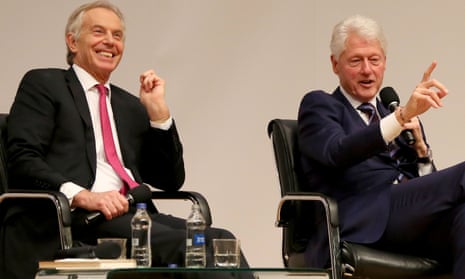Tony Blair has accepted that Britain and Ireland will have to work around rather than reverse Brexit in order to prevent a hard border on the island and preserve the Good Friday agreement.
While stressing he was still “passionately opposed” to Brexit and regarded the UK leaving the EU as a “profound mistake”, the former prime minister said that the two countries would have to “overcome the challenge” posed by the British departure from Europe.
Speaking at an event in Belfast on Tuesday to mark 20 years since the signing of the Good Friday agreement peace accord, Blair said it was essential to avoid the disaster of a hard border reappearing on the island post-Brexit.
On the challenges Brexit will pose for Ireland, Blair said: “We are just going to have to work at it [Brexit] and overcome it. I wish it wasn’t happening but it is and we are just going to do our best to circumvent it.”
He also urged the current generation of Northern Ireland’s political leaders “not to cast aside” the gains of the Good Friday agreement peace deal.
Commenting on the present deadlock between unionism and nationalism in Northern Ireland, Blair said: “Where we are may not be where we want to be but it’s a much better place from where we were.
“This is the most important thing I would say right now to those people today who are in positions of responsibility: try to work your way through the present impasse, give it your all, start working at it, don’t ever give up because what you are doing is vital, it is important.”
Bill Clinton received a rapturous reception when he entered the Whitla Hall on the campus of Queen’s University Belfast to join a conference entitled Building Peace: The Belfast/Good Friday agreement.
Clinton described the agreement as a “work of surpassing genius” which still showed the rest of the world the value of parliamentary democracy over dictatorships and authoritarianism.
The former US president, who invested a considerable amount of his time in office supporting the Northern Ireland peace process, said the agreement was about “real democracy, majority rule, minority rights, individual rights, the rule of law, the end of violence, shared political decision-making and shared economic benefits”.
Yet the 20th anniversary celebrations for the agreement at Queen’s University Belfast on Tuesday took place in the shadow of darkening relations between the two main parties represented in the devolved assembly the deal established.
The Democratic Unionist party and Sinn Féin seem no closer to reaching a compromise of their own, after the power-sharing government in Belfast broke down 16 months ago.

Another deep division threatening to destabilise the agreement – Brexit – continued to be raised at a series of press conferences involving key players in the peace accord two decades ago.
Peter Robinson, Northern Ireland’s former first minister and former Democratic Unionist leader, also warned other unionists not to be deluded into wishing for a “hard border” after Brexit.
“There are actually some unionists who think: ‘We hope everything goes wrong in the Brexit negotiations and we have a hard border, and therefore a real division on the island thus strengthening our position with the United Kingdom.’
“This is an anathema and it will not help Northern Ireland.”
Robinson added that this scenario “should be avoided” in terms of Brexit and any hard border.
One of the original architects of the Belfast agreement, former Irish premier Bertie Ahern, said he hoped the “cast iron guarantee” the present British government had given the people on the island of Ireland – as well the EU – that there will never be a hard border would be adhered to.
Former Sinn Féin president Gerry Adams tried to sound upbeat about the chances of breaking the current political deadlock.
Describing the 1998 agreement as a “highly significant development in Anglo-Irish history”, Adams added that the accord could still act as a “template for the times ahead” in fresh political negotiations aimed at restoring power-sharing.
There was discord even within the Irish nationalist representatives at the conference to commemorate 20 years of the agreement. Adams confirmed that Sinn Féin wanted a “border poll” on a united Ireland.
Seamus Mallon, the former Social Democratic and Labour party deputy leader and former deputy first minister, said calls for a referendum on Irish unity posed dangers.
Mallon said it would be a “bloody disaster” if any referendum on a united Ireland could be won by a simple majority of 50% plus 1.
In such a scenario, Mallon warned, Ireland would inherit a fearful, recalcitrant large unionist minority on the island.
